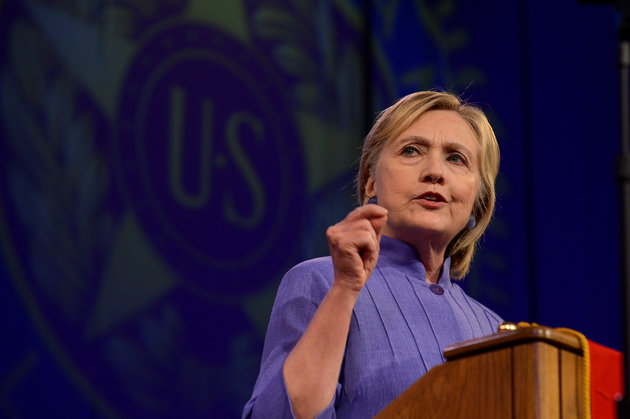
Democratic presidential candidate Hillary Clinton, speaking to a U.S. veterans group on Wednesday, made an open appeal to Republican and independent voters concerned about rival Donald Trump’s national security credentials and his fitness for office.
“This election shouldn’t be about ideology. It’s not just about differences over policy,” Clinton told an American Legion convention in Cincinnati. “It truly is about who has the experience and the temperament to serve as president and commander in chief.”
Clinton, a former secretary of state and former U.S. senator, at times sounded like the Republican candidates Trump defeated to win his party’s presidential nomination. She highlighted the United States’ role as a global superpower and celebrated “American exceptionalism,” a term frequently used by conservatives in a foreign-policy context.
“When we say America is exceptional ... it means that we recognize America’s unique and unparalleled ability to be a force for peace and progress,” Clinton told the veterans. “When America fails to lead, we leave a vacuum.”
She harshly rebuked Trump, accusing him of advocating a retreat from global affairs and suggesting that his calls for U.S. forces to torture terror suspects and threaten their families would make the country less safe.
The speech came on the same day that Trump was slated to meet with Mexico’s president, Enrique Pena Nieto, in Mexico City in an attempt to bolster his own foreign-policy profile before delivering a speech on immigration policy Wednesday evening in Arizona.
In her speech, Clinton cited the endorsements of dozens of members of the Republican foreign-policy establishment. On Wednesday, she secured another one from James Clad, a former deputy assistant secretary of defense under President George W. Bush.
In a comment that has sparked criticism from many Republicans, Trump has called the U.S.-led NATO military alliance obsolete, although he has since pledged to work with NATO to defeat Islamic State. He has also vowed to build a wall along the U.S. border with Mexico and to make Mexico pay for it.
Brian Katulis, a national-security analyst at the liberal Center for American Progress think tank in Washington, said Clinton’s remarks were in line with “a bipartisan consensus about how we can best keep America safe and secure.”
Trump, he said, stands outside that consensus - something the Clinton campaign has attempted to exploit in courting Republican voters concerned about his rhetoric and lack of government experience.
John Feehery, a Republican strategist in Washington, said Clinton’s approach could peel off some wavering voters, but could cost her support from liberals and others who are wary of overseas conflicts after protracted wars in Afghanistan and Iraq.
“It could lose her votes on the left from folks who are tired of us blundering into any more wars,” he said. “Most voters think we should focus on the home front.”


